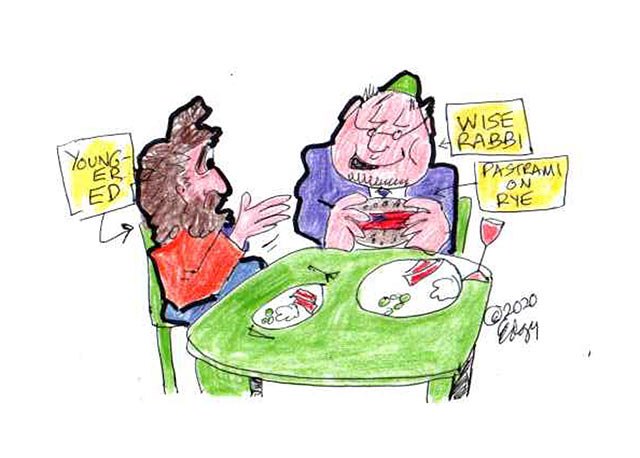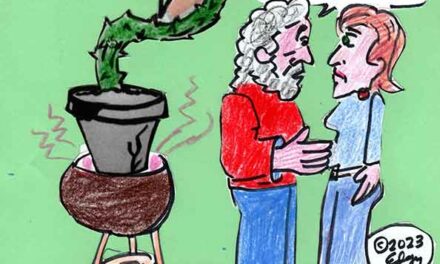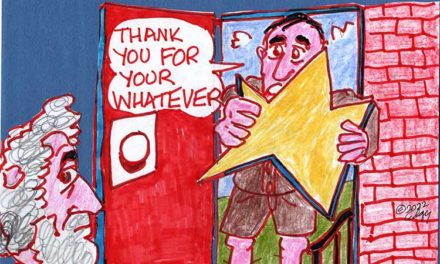The Jewish New Year Begins at Sunset: Grab Your Oys-Maker!
A brief and likely uninformed treatise on my people’s High Holy Days
By Ed Goldman
At sunset today, the Jewish High Holy Days begin with Rosh Hoshanah, the “head”(rosh) or beginning of the year 5780. The commemoration reaches its zenith nine sunsets later with Yom Kippur (Day of Atonement), when the annual singing of “Kol Nidre” is as comforting to my people as when Sir Paul McCartney sings ”Yesterday” at a concert—even though you expect it, you’re still thrilled when neither disappoints.
Kol Nidre means “all vows,” by the way. Unlike Catholic confession, the Jews front-load all of the anticipated sins they’ll commit in the coming year, taking only one day to ask advance forgiveness, instead of the average four days per annum that Catholics attend confession.
The first Holy Day often includes big meals that are as sumptuously delicious as they are unhealthful. The second demands that Jews fast from sunset to sunset, which I never did—except between successive surgeries at Sutter Hospital. But there they at least gave me an intravenous drip of dextrose to keep me going. That would be a no-no on Yom Kippur, even if you brought your own stanchion and nursing team.
I was always afraid I’d fall ill from voluntary fasting—and secretly hoped that the rabbi and licensed nutritionists would agree, calling a joint news conference to issue the statement, “For optimum health, we think boys like Edward require regular infusions of cinnamon rolls.”
But a recent New York Times “Well” column in the newspaper’s Science Tuesday section, dashed all that by addressing the benefits of regular, controlled fasting “to shed pounds.” And what could be more regular and controlled than doing it only one day per year and only from one sunset to the next one?
“In an eight-week trial published in ‘Cell Metabolism,’ scientists randomly assigned 58 obese men and women to three groups,” the Times reported. “The first ate whatever they wanted without counting calories, but only between 3 p.m. and 7 p.m. The second ate what they wanted between 1 p.m. and 7 p.m. The third, a control group, ate without restrictions.
“In both of the groups that practiced time-restricted fasting, participants consumed an average of 550 fewer calories a day and lost about three percent of their body weight.” While there was no indication in the story if, for the third group, carpenters had to be called in to widen the doorways for their exit from the clinic, that’s my theory and I’m sticking to it.
But fasting’s not all one’s supposed to do for Yom Kippur. Things other than food and beverage to abstain from include the wearing of leather shoes, bathing, wearing perfumes or after-shave and, as rabbis specify, having “marital relations.” I’m sure some system gamers have wished that last one meant it’d be therefore permissible to fool around with someone to whom they’re not married. But come on, fellas. Let’s not be male chauvinist pagans.
Understand, I’ve been Jewish since birth. This may sound obvious but often a religion is something you can choose—rarely during infancy, natch, when you’re too busy discovering those really are your own toes, which doesn’t leave you much time for taking a course in comparative belief systems.
My middle brother Stuart, for example, converted to Zen Buddhism a few years before he died. And I have a cousin who became a Mormon for a few years but apparently missed her Frappuccinos®.

I did a lot of reading about Catholicism over the years because I was struck by how many of my favorite writers and artists supposedly converted to it—though usually not long before they checked out of the Earth Hotel. I think this may have had something to do with the religion’s abrupt appeal, since a core belief is that you’re simply heading to the Afterlife, a concept that makes an “after-party” seem quite insignificant.
Conversely, you won’t find too many people becoming Jews at the last minute, especially if they dare to ask a rabbi if his people believe there’s a Heaven awaiting them.
“Yeah,” I persisted, “but what about the clouds and robes and harps and angels and halos and Saint Peter—”
He smiled at me with a pained look that seemed to say, “So young. So stupid.”
But he said aloud, “We believe that living a good and honorable life is a form of Heaven.—Betty, this brisket is to die for. May I have another slice?” In short, End of Seminar. Betty was my mom, and her brisket was the envy of shoemakers, especially as a last-minute leather substitute every Yom Kippur.
Ed Goldman's column appears almost every Monday, Wednesday and Friday. A former daily columnist for the Sacramento Business Journal, as well as monthly columnist for Sacramento Magazine and Comstock’s Business Magazine, he’s the author of five books, two plays and one musical (so far).














